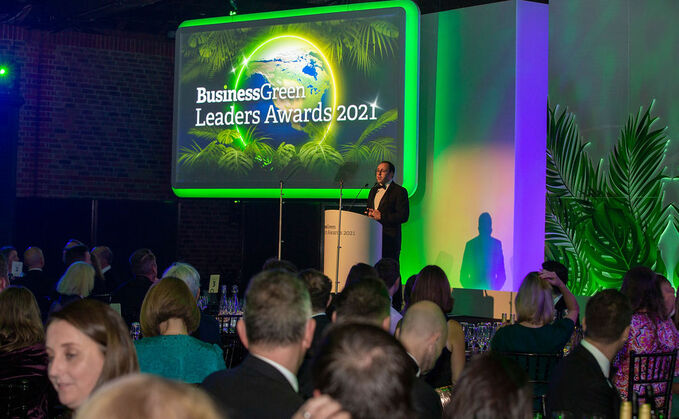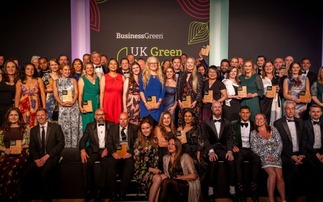
The 2021 award ceremony took place on 22 September at the Brewery
James Murray's speech to the BusinessGreen Leaders Awards 2021 - in full
Ladies and gentlemen, welcome to the 11th annual BusinessGreen Leaders Awards.
More sustainable than a COP26 zoom meeting.
More competitive than the post-Brexit jobs market.
More cautiously optimistic than Emma Raducanu's bank manager.
The BusinessGreen Leaders Awards are both the UK's most prestigious green business awards and a crucial component of this year's Net Zero Festival.
As such tonight is above all else a celebration.
A celebration of the best of the green economy and the continued advance of the net zero transition.
A celebration of your remarkable achievements and admirable resilience over the past two years.
A celebration of the chance to cautiously bring people back together once again.
When we last gathered here just over two years ago for the ninth BusinessGreen Leaders Awards it happened to coincide with the very same day that the UK's net zero target passed onto the statute book.
An awful lot has changed in the short time since we were last able to host these awards in person.
The rush of net zero targets now covers two thirds of the global economy, while the wave of electric flights, floating wind turbines, and rewilding projects continues to gather pace.
After flirting with the idea of a murderous coup, Donald Trump has decided to spend more time with his climate scepticism in a fast sinking Florida.
And then there was the small matter of a world-halting, deadly pandemic.
The theme for tonight's celebrations is mid-pandemic chic, with a hint of clean tech optimism and a shadow of climate ravaged dystopia.
Who would have thought two years ago that the logistical notes for the next BusinessGreen Leaders Awards would be less e-tickets and carriages and more vaccination passes and lateral flow tests?
We're giving a whole new meaning to the idea of a masked ball.
I was at an event last week where people were invited to wear wrist bands to indicate how comfortable they were feeling with social contact this evening.
Red meant please no handshakes; white meant they would welcome a hand shake, presumably with a side order of sanitizer; and blue meant… meet me in the bathroom.
To be honest, I was not expecting to get to my 40s and still have to navigate the social anxiety of a Freshers' Ball traffic light party, but we are where we are.
More seriously, everyone here has had to demonstrate they are double jabbed or provide a negative covid test, but please do try and give people space where possible and respect people's choices.
We are, of course, all finding our way in a new era defined by volatile levels of risk, looming known unknowns, and the trauma of trying to process a still rolling tragedy. If anyone should understand how difficult that is, it is those of us who work every day to tackle climate change.
With both crises, kindness and empathy are pretty useful tools for navigating your way forward.
That and a clear sense of community harnessed in pursuit of a shared mission.
One of the defining and yet under-reported stories of the past few years has been the green economy's continued march into the mainstream and the accompanying surge in public engagement with the natural world. In an age of uncertainty and dislocation, this community is reshaping the world for the better.
Emissions have continued to fall, clean tech records have been routinely toppled, and, as you will see at next week's Net Zero Festival, emissions targets are now being translated into coherent and credible decarbonisation strategies.
Meanwhile, the public has never been more concerned about the escalating climate threat, nor more convinced by the restorative power of nature.
It is notable that as the negotiations ahead of the crucial COP26 Climate Summit intensify, the Prime Minister is this week in New York telling world leaders that the arguments against climate action that he himself once espoused have been utterly routed, and that in the future "the only great powers will be green powers".
In doing so he suggested that "climate change is no longer an issue that solely concerns the unkempt fringes", which feels a bit rich coming from a man with what we can only describe as a somewhat unique personal style - if David Cameron gave his hairdresser an MBE, Boris Johnson's will deserve a George Cross.
But leaving Johnson's criticism of 'bunny-huggers' to one side, the tacit admission is clear. You and your peers around the world won the argument.
You did so through your ingenuity, your entrepreneurialism, and your resilience.
You did so through many of the projects, innovations, and companies celebrated here this evening.
You did so by demonstrating that a clean, healthy, and sustainable economy is achievable, desirable, and essential.
And you convinced not just Johnson, but President Xi, who this week declared China would stop financing overseas coal power plans; President Biden, who just promised to ramp up US climate finance; and the CEOs of virtually every top business and major investor on the planet.
Inevitably, this vision continues to face some pockets of resistance, which have this summer attempted to argue that the best response to surging fossil fuel prices is to increase our reliance on fossil fuels and the most sensible way to handle escalating climate impacts is to ignore that they are happening and complain about the cost of climate action.
It is an argument that is doomed to collapse under the weight of its own contradictions, the force of the rising tides, and the unstoppable economic advance of cost-competitive clean technologies. As Keynes once observed, "anything we can actually do we can afford".
Again, this victory will be yours - and Keynes', obviously, it can takes decades, but he always tends to be proved right in the end.
It is vital to remember this progress is being made. Because as we are all painfully aware the scale of the challenge remains beyond daunting.
The pandemic is not yet over and it is highly possible that it is not the last health crisis we will face. Meanwhile, emissions are rising again. The latest IPCC report on the scale of the climate threat was legitimately terrifying.
We have but 30 summers left to complete the fastest industrial revolution in history and build a global net zero emission economy.
All of which only serves to make the work showcased this evening even more impressive.
So thank you.
Thank you to our judges for their time and expertise.
Thank you to the BusinessGreen team that worked so hard to enable this evening.
Thank you to our charity partner Little Sun, who you will be hearing more about later.
And thank you to our sponsors for this evening, Persefoni, and our many commercial partners for this year's Net Zero Festival:
Atkins, BCG, Schroders, The Climate Pledge, Bank of America, Derwent London, Drax, Energy Saving Trust, Engie, Facebook, GSK Consumer Healthcare, Hitachi, Kingspan, Midrex, Tetra Pak, and Volvo.
Without the support of such partners we would not be able to host events such as this evening's awards and next week's Net Zero Festival - which you absolutely must sign up to if you haven't already.
Most of all though, thank you to all of our finalists.
At the end of this year's judging process, I received an email from one of the judges, in which they wrote:
"It's trite to say they all deserved to be winners, but I really did struggle to differentiate between so many who were all deserving of high marks. I came away from the judging feeling incredibly heartened and inspired by the number of wonderful entries; the variety of sustainable projects, the innovation, the dedication of so many individuals to drive positive change. I reviewed the applications at the same time as the most recent IPCC report came out full of doom and gloom - it was a restorative tonic to read about individuals and companies really trying to do things to make a difference."
They are right, of course. This year's awards really were more competitive than ever. There were numerous close calls and it is genuinely the case that everyone here tonight deserves to be celebrated.
As I say every year, if you do miss out on the main prize this evening, y'know, be cool.
Because if the past few years have taught us anything it is that there are few things more important and more powerful than a sense of community.
And the green economy is a community - a competitive community for sure, but one that can share in each other's successes and build on each other's endeavours.
A community that throughout one of the most difficult and tragic periods many of us have ever experienced somehow managed to redouble its efforts to build a better economy.
During the interminable depths of the first lockdown, when the pubs and the schools were shuttered and padlocks bedecked the playground gates, the Murray household found itself leaning heavily on the grand philosophical lessons contained in that classic masterpiece, The Lego Movie 2.
"Everything's not awesome,
That's not a realistic expectation.
But that doesn't mean
We shouldn't try.
To make everything awesome
In a less idealistic, kind of way."
Good luck and huge congratulations to all our finalists this evening.
Thank you.









